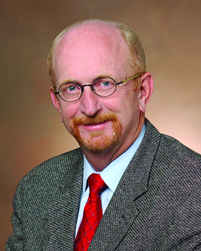Rheumatologists can effectively treat rheumatoid arthritis (RA), but it’s rare that a case can be put into a durable remission without continuation of therapy.
But what if RA could be stopped before it becomes full-blown arthritis?

In a Tuesday morning ACR basic science symposium, V. Michael Holers, MD, Head of the Division of Rheumatology at the University of Colorado School of Medicine, will discuss his efforts to answer that question in the Rheumatology Research Foundation Memorial Lecture Honoring Dr. L. Emmerson Ward: Rheumatoid Arthritis (RA) Mechanisms and Predictors of Pre-clinical RA.
“We think that RA is a process that starts outside the joints, probably at mucosal sites, and during progression may involve several different kinds of mucosal sites that are perhaps even unique to different individuals,” said Dr. Holers, who is also a co-founder of Studies of the Etiology of Rheumatoid Arthritis (SERA), focused on understanding RA’s early pathogenesis and natural history.
Research by the SERA group and key collaborators into seropositive RA has found biomarkers specific to RA in the blood five to 10 years before clinical onset of the disorder. In studying people with these patterns of antibodies, Dr. Holers and his collaborators have found evidence of systemic inflammation and a subset identified and under study by Kristen Demoruelle, MD, rheumatologist and researcher at the University of Colorado Denver, exhibits subclinical pulmonary disease.
“It appears that there is ongoing inflammation in the lung that may be chronic, and that may be the initial driver in some individuals of the development ultimately of RA,” Dr. Holers said.
Studies have shown that stopping smoking reduces the risk of future RA, Dr. Holers said, but that is difficult for people to do and it takes two decades for those individuals to return to baseline risk.
A SERA research group led by Jill Norris, MPH, PhD, with the Colorado School of Public Health, has also found that people with low levels of omega-3 fatty acids are more likely to have or develop the antibodies that are predictive of future disease. Dr. Holers will outline some new findings about omega-3 fatty acids and the genetic relationships of that risk factor.
The lecture will also update the audience on a clinical trial that one of the SERA leaders, Kevin Deane, MD, University of Colorado School of Medicine, has initiated to see whether clinicians can stop the development of RA.
Holers’ research group has also developed an animal model of the pathogenic role of the autoantibody system directed to citrullinated antigens, commonly called anti-CCP antibodies. These studies have clearly shown that these autoantibodies are pathogenic and are opening up additional therapeutic targets and opportunities.
So how do physicians decide who to screen for these antibodies when they exist prior to any clinical symptoms?
“That is one of the big questions that I will raise for the audience,” Dr. Holers said. “I will discuss various approaches to screening. That is obviously important.”
Dr. Holers said he and the SERA research group focused its research on the pulmonary system initially because of literature that pointed to the lungs as being involved in the very early stages of arthritis as well as in latter stages of the disease.
One of their current hypotheses, however, is that different mucosal sites might generate unique biomarkers for RA. Dr. Holers said the SERA group is also studying the microbiome to see if it produces any predictive antibodies.
Dr. Holers wants the audience to come away feeling hopeful about the future of early treatment and diagnosis of RA even before arthritis develops.
“We’d like the audience members to understand that there are many opportunities in RA to find out how the disease develops and to stop that from occurring,” he said. “We want to be disease prevention experts.”
